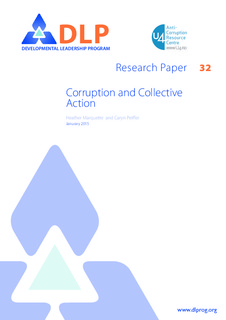Corruption and collective action
Research report
Permanent lenke
http://hdl.handle.net/11250/2475090Utgivelsesdato
2015-01-01Metadata
Vis full innførselSamlinger
- Publications [1488]
Originalversjon
University of Birmingham, UK (DLP Research Paper 32, 2015) 16 p.Sammendrag
Increasingly it is argued that anti-corruption efforts have not worked because they are based on inadequate theory, suggesting that collective action theory offers a better understanding of corruption than the principal-agent theory usually used. This paper, published in collaboration with the Developmental Leadership Programme (DLP) , argues that both theories are in fact valuable. But both miss out an important third perspective, which is that corruption can serve important functions, solving difficult problems that people face, especially in weak institutional environments. Effective anti-corruption initiatives are so hard to achieve because they often require insights from all three of these perspectives. (This paper is part of a jointly funded initiative by DLP and U4)
